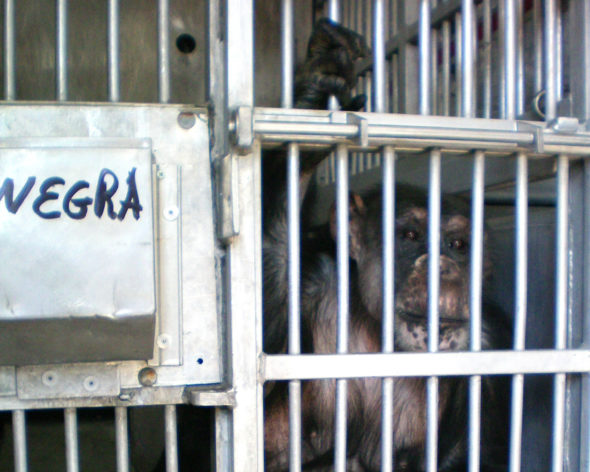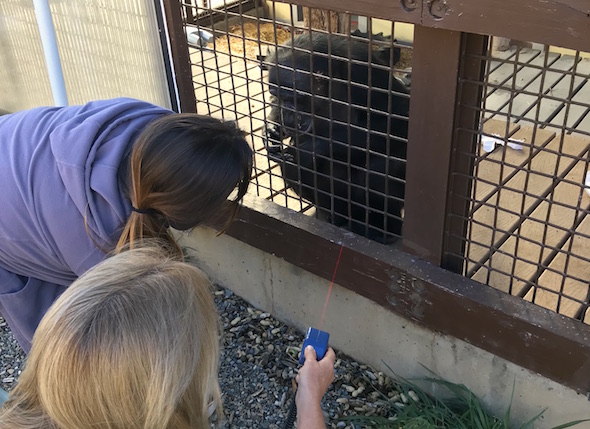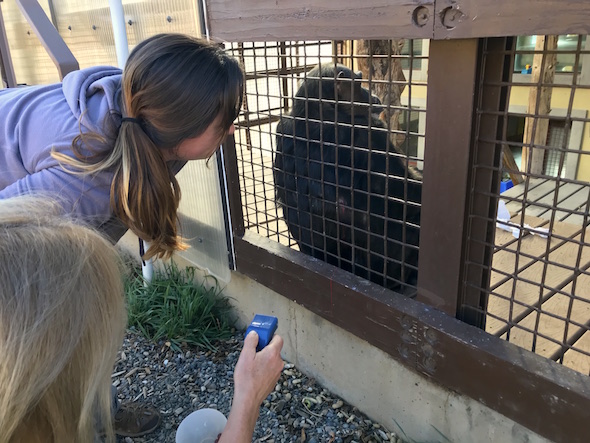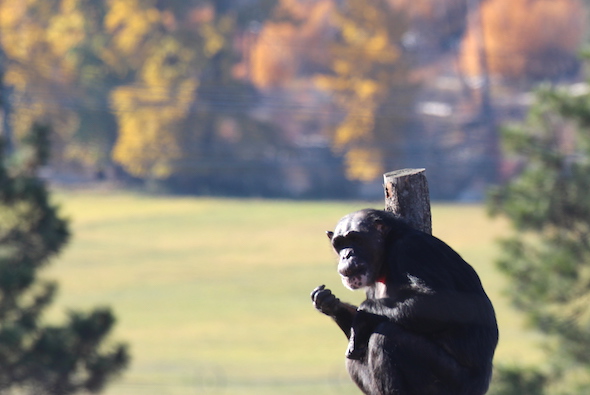Providing medical care to chimpanzees is always a challenge, but it can be particularly difficult when they have been subject to decades of invasive medical research procedures against their will.
Years ago, we participated in a study that considered whether chimpanzees might exhibit abnormal behaviors that cluster into syndromes similar to posttraumatic stress disorder and depression in humans (you can read it here). Negra was featured in the paper as a case vignette:
A chimpanzee named Negra was a 36-year-old female at the time of the study. Taken from the wild in Africa as an infant, she has remained in captivity since that time. She was used in invasive research, including hepatitis experiments, and for breeding. Each of her infants was removed from her at an early age. During the period in which she was used in research, she was kept in isolation for several years. Approximately 1 year prior to the study, she was transferred to Chimpanzee Sanctuary Northwest in Washington state, where she currently lives with six other chimpanzees.
Negra met alternative criteria for depression and PTSD. According to reports, she had persistent depressed hunched posture, and she was socially withdrawn. Negra slept excessively during the daytime, and she lacked interest in play, food, other individuals, and grooming. She also demonstrated poor attention to tasks. She was described as slow and sluggish, and at times, she appeared anxious. In response to an unexpected touch, she would “threat bark,†scream, or run away. Compared with other chimpanzees, she demonstrated less variability in her facial expressions. Caretakers reported that her face was expressionless, “like a ghost,†for at least a month after she arrived at the sanctuary. She seldom, if ever, exhibited a play face. She was tested for a thyroid disorder and assessed for other medical causes of her clinical presentation, but all laboratory tests were within normal limits. Based on later reports provided by her caretakers, some of her symptoms have improved since she has been living in the sanctuary. She has become more interested in other chimpanzees, including grooming, and the variability in her facial expressions has increased.
Negra’s anxious response to being touched was not just a sad reminder of her earlier trauma; it was a serious impediment to her care at the sanctuary. Chimpanzees routinely receive wounds from fights, they develop dental problems, they get heart disease and diabetes and many other illnesses, and these things often require medical intervention.
There’s always a way to force medical care on an uncooperative chimpanzee, and sadly that is what’s required from time to time. But that can be stressful and even dangerous. They deserve a chance to participate willingly. Giving them that choice, however, requires a lot of time and energy on the part of their caregivers.
For years, CSNW caregivers (first Debbie and now Anna) have been working with Negra to habituate her to basic medical evaluations and treatments as part of our positive reinforcement training program. These efforts have paid off many times over, most recently when Negra received a wound to her back during a fight. Negra let Anna spray the injury with antiseptic solution and she allowed Dr. Erin to follow that up with laser therapy. In cases where antibiotics may be needed, Negra will even let her caregivers swab the wound to culture the infection and determine the best course of treatment.
For some chimpanzees, this kind of cooperation is no big deal. But chimpanzees are individuals – they have unique life experiences and they cope with those experiences in different ways. Negra has never given her trust lightly. It had to be earned through years of persistent efforts on the part of her caregivers.
It has certainly been worth it.








